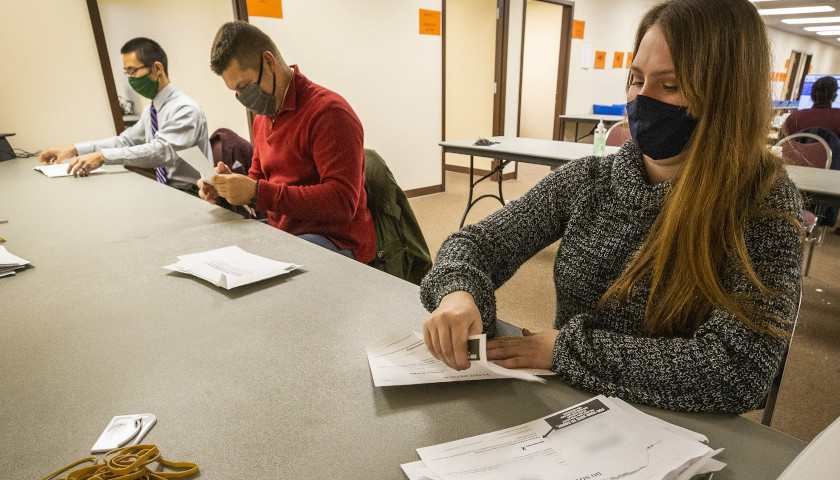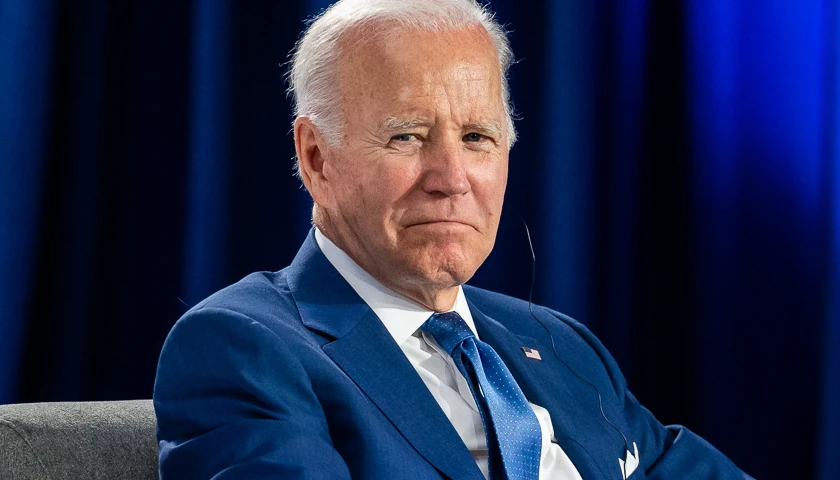by Natalia Mittelstadt
Amid delivery delays by the United States Postal Service and mail-in ballot fraud, Democrats and the media are finally acknowledging there are some issues with mail-in voting ahead of the 2024 presidential election.
As mail-in voting has increased since the 2020 presidential election during the COVID-19 lockdowns, Democrats have advocated for it as an easier method of voting. However, as USPS has experienced delivery issues and ballot harvesting has led to at least one “redo” election, some Democrats and media are noting the issues with the voting method.
USPS started using a new distribution system last year, which appears to have contributed to delays in mail delivery. This can affect the delivery of mail-in ballots both to voters and back to election departments, about which officials have warned both USPS and voters.
Sen. Gary Peters, D-Mich., sent a letter to Postmaster General Louis DeJoy regarding the delivery issues impacting elections, noting that “The nature of USPS’s network changes has now raised significant concerns including the potential for degraded rural service due to fewer facilities, delayed delivery of election mail that would be processed at out-of-state facilities, and critical health information such as laboratory tests not being processed same-day due to decreased transportation trips. These changes and lack of transparency have also caused concerns for other Members of Congress, who have asked for similar information and received insufficient responses.”
In February, general registrar in Richmond, Virginia told voters ahead of the March primary election to drop off their mail-in ballots in ballot drop boxes, rather than sending them through USPS.
“The reports we’ve been receiving about delayed, misplaced, or even missing mail are deeply troubling, especially as we approach crucial electoral events like the Presidential Election in November,” Richmond General Registrar Keith Balmer wrote in a blog post shared on the election office’s X account (formerly Twitter).
USPS told NBC News that, for the November election, it will “employ a robust and proven process to ensure proper handling and delivery of all Election Mail, including ballots.”
Meanwhile, in Connecticut, after alleged ballot harvesting occurred during the September primary election last year and resulted in a court-ordered “redo” election, the Democratic Secretary of the State Stephanie Thomas advised voters to cast their ballots in person ahead of the Bridgeport mayoral redo primary election in January.
Thomas said that their election monitors “cannot do it all, and we encourage anyone who can do so to vote in person on January 23rd. If someone voted by absentee ballot but is unsure if they should have done so, they may withdraw their absentee ballot by going in-person to the Town Clerk’s office before 10 a.m. on Election Day, and they may then vote at their assigned polling place.”
Last year, in a lawsuit to overturn a Wisconsin Supreme Court ruling that concluded ballot drop boxes are illegal, a Democratic Party-aligned election law firm argued that U.S. Postal Service mailboxes are in fact “unsecured.”
The Elias Law Group is suing the Wisconsin Elections Commission on behalf of Priorities USA, the Wisconsin Alliance for Retired Americans, and a voter over the state Supreme Court’s ruling against ballot drop boxes.
In the legal filing, the firm also appears to argue drop boxes are more secure than mailboxes.
“By restricting Wisconsin voters’ options for returning their absentee ballots and having those ballots properly counted, the Drop Box Prohibition severely burdens the right to vote,” the filing states. “Without the opportunity to drop off their absentee ballots at drop boxes, voters must instead rely on the U.S. Postal Service – and its unsecured mailboxes – to deliver their absentee ballot and simply hope that the ballot arrives by election day.”
Elias Law Group was started in 2021 by Democratic election lawyer Marc Elias, who in March 2020 advocated for states to switch to mail-in voting because of the COVID-19 pandemic.
“It will not be enough for states to simply allow more citizens to vote by mail [original emphasis]. Each state must also provide adequate resources for the printing and distribution of millions of extra ballots and to support with extra funds the officials who are tasked with processing and counting the flood of mailed ballots,” Elias wrote in a March 2020 op-ed for the Washington Post.
“Most important, for this system to work, states must be prepared to process and count the avalanche of ballots that will be postmarked by Election Day but arrive at election offices in the days afterward,” he also wrote.
The federal government has also acknowledged issues with mail-in voting.
The Department of Homeland Security’s Cybersecurity and Infrastructure Security Agency (CISA) censored social media narratives about mail-in voting concerns in 2020 despite knowing the risks of vote-by-mail, according to documents released by America First Legal in January.
America First Legal is suing CISA for 2020 records from its mis-, dis-, and malinformation (MDM) team. According to records obtained by America First Legal from its lawsuit and released on Monday, CISA knew that mail-in and absentee voting are less secure than voting in person.
Some of those issues included outsourced risks to the United States Postal Service, leading to a greater possibility that problems such as cyber attacks could occur.
However, CISA still supported the widespread policy change to mail-in voting across the country and censored social media narratives regarding mail-in voting concerns.
CISA contracted accounting and consulting firm Deloitte to monitor and flag social media posts regarding the 2020 election. These posts included concerns about mail-in voting, such as former President Donald Trump’s Twitter post that there were “big problems and discrepancies with Mail In Ballots.”
Years before the 2020 election, a bipartisan group analyzed mail-in voting and raised their own concerns.
In 2005, the bipartisan Commission on Federal Election Reform – which included ex-President Jimmy Carter and former Secretary of State under President George H. W. Bush, James Baker – highlighted the issues that concerned them about absentee ballots.
“While vote by mail appears to increase turnout for local elections, there is no evidence that it significantly expands participation in federal elections,” the commission wrote. “Moreover, it raises concerns about privacy, as citizens voting at home may come under pressure to vote for certain candidates, and it increases the risk of fraud.”
“Vote by mail is, however, likely to increase the risks of fraud and of contested elections in other states, where the population is more mobile, where there is some history of troubled elections, or where the safeguards for ballot integrity are weaker,” the commission also said.
Republicans have warned of the potential insecurities of mail-in voting for years and are looking to secure or ban certain aspects of it, such as ballot harvesting and ballot drop boxes. However, the GOP is now starting to embrace the same tactics this election cycle.
Last June, the Republican National Committee announced its “Bank Your Vote” initiative, which “will encourage, educate, and activate Republican voters on when, where, and how to lock in their votes as early as possible, through in-person early voting, absentee voting, and ballot harvesting where legal,” according to the RNC’s announcement.
– – –
Natalia Mittelstadt graduated from Regent University with Bachelor of Arts degrees in Communication Studies and Government.






Which means they are planning something… Never trust a democrat.
Surprise! Surprise! Surprise!